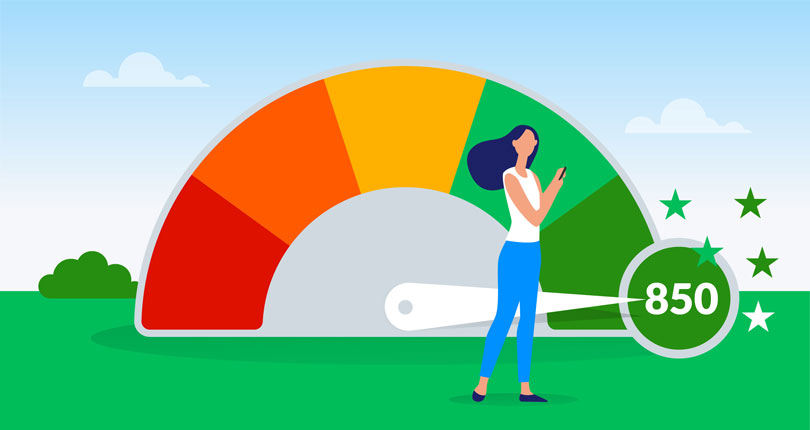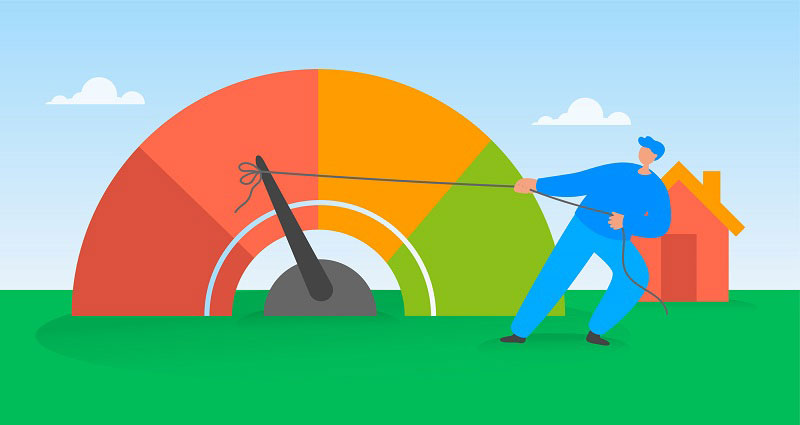What is the Highest Credit Score?
The highest credit score possible is 850. This is considered the perfect credit score. 850 is the top score you can get in both the FICO and VantageScore credit scores.
Credit score ranges typically vary from poor to exceptional, with 300 being the minimum poor credit score and 850 being the maximum exceptional score.
- Poor: 300-579
- Fair: 580-669
- Good: 670-739
- Very good: 740-799
- Exceptional: 800-850
Some of the key benefits of having a perfect credit score include paying lower insurance premiums, getting approved for credit or loans more easily, and qualifying for lower interest rates. As of the third quarter (Q3) of 2023, in the U.S., just 1.54% of people have the highest credit score of 850. [1] Experian - Who has a perfect credit score and what do they have in common? https://www.experian.com/blogs/ask-experian/perfect-scores-who-has-them-and-what-do-they-have-in-common/
The average credit score in the U.S. is 715 as of Q3 2023 but this varies by state and is always changing based on people’s financial circumstances. [1] Experian - Who has a perfect credit score and what do they have in common? https://www.experian.com/blogs/ask-experian/perfect-scores-who-has-them-and-what-do-they-have-in-common/
How to get a perfect credit score
Research from FICO [2] Traits of the 800 FICO score holder https://www.myfico.com/credit-education/blog/traits-of-the-800-fico-credit-score-holder showed that consumers in the U.S. with credit scores of 800 or more typically have similar habits when it comes to their finances.
If you want to get a perfect credit score, consider practicing these habits when dealing with credit cards, auto loans, and other types of credit:
- Make payments on time - Your payment history makes up the largest proportion of your credit score, meaning people who always pay on time have better scores.
- Keeping credit use to a minimum - According to FICO, people with the highest credit scores only use around 7% of the credit that’s available to them.
- Maintain low balances on your credit accounts - Consistently high balances on your credit accounts can lower your score.
- Have a variety of credit accounts - People with the highest credit scores typically have a range of credit types including auto loans, credit cards, and mortgages. A good mixture of credit shows that creditors trust you with the money they lend to you.
- Applying for credit carefully - Opening a lot of credit accounts in a short period of time or having lots of hard credit checks on your file can signify risk and lower your score. Be careful when applying for new credit and make sure you build up your score before applying for more.
There are many more tactics you can apply to build credit and bump your score over time. Some things may seem small, but they all contribute to your score.
It’s important to bear in mind that an 850 credit score can be elusive, and credit scores change all the time depending on people’s financial habits, debt, payment history and applying for new loans. If you manage to achieve the maximum credit score of 850, it may not stay that way for long.
How much do different factors impact credit scores?
There are some key pieces of financial data that affect your credit score, but they don’t all have an equal impact. Below you can see the breakdown of credit data categories and how FICO uses them to calculate your score [3] FICO - What’s in your credit score? https://www.myfico.com/credit-education/whats-in-your-credit-score:
- 35% - Payment history
- 30% - Amounts owed
- 15% - Length of credit history
- 10% - New credit
- 10% - Credit mix
Your payment history
The key piece of data that affects your credit score the most is your payment history, with this making up 35% of your overall score. [3] FICO - What’s in your credit score? https://www.myfico.com/credit-education/whats-in-your-credit-score Your payment history shows lenders how risky it is to extend credit to you, and how likely you are to make your payments on time. This means if you regularly make your payments on time, it will make a big contribution towards you having a better credit score.
The amount you owe
Amounts owed makes up the second highest proportion of your credit score at 30%. Owing money on your credit accounts doesn’t necessarily make your credit score lower, but using a lot of your available credit could signal that you are overstretching your spending and more likely to default on payments.
Length of credit history
The length of your credit history contributes to 15% of your overall credit score. Generally, people with longer credit histories and established accounts will have higher credit scores, but having a shorter credit history doesn’t necessarily mean your score will be low.
New credit accounts
New credit accounts you take out account for 10% of your credit score, which is fairly small but still worth considering. Opening lots of new credit accounts in a short space of time can have a negative impact on your score, especially if you have a short credit history.
Your credit mix
Your credit mix is the different types of credit cards, accounts, and loans you have, and FICO will factor this in when determining your score. Credit mix also makes up 10% of a credit score so it has less of an impact in determining your score compared to factors like payment history. A good rule of thumb is to have at least one type of revolving credit and one type of installment credit. [6] Experian - What is Credit Mix? https://www.experian.com/blogs/ask-experian/what-is-credit-mix-and-how-can-it-help-your-credit-score/#:~:text=There's%20no%20such%20thing%20as,financial%20moves%20throughout%20your%20life
The benefits of having a high credit score
There are many benefits to having a high credit score, especially when it comes to taking out new credit or loans. Some of these advantages include:
- Lenders will see you as someone who uses credit responsibly, and will be more likely to approve you for credit. It’s important to remember that your debt-to-income ratio and other factors will also contribute to loan approvals, and your credit score is not the only thing that will be considered.
- You should be able to get higher credit limits on credit cards, loans and other credit accounts if you have a high credit score, but again it is not the only factor that goes into deciding this. Other factors like debt-to-income ratio also have an effect.
- Insurance premiums can be lower if you have a higher credit score as some insurance companies use credit scores to decide who to approve and how much to charge.
- You can usually qualify for lower interest rates as lenders often typically offer these to borrowers with the highest credit scores.
- Having a higher credit rating can help make it easier to get a mortgage or rent a property.
- You may be able to get a better deal on a cellphone and it’s less likely you’ll need to put down a prepay or deposit.
These things can all make life a little bit easier when it comes to your finances, and taking out credit or loans for a range of purchases.

How to Rent with Bad Credit
Leasing an apartment or home
with bad credit can be a challenge,
but if you follow the right steps
some landlords may be willing to
work with you.
Download our guide
How long does it take to get the highest credit score?
The amount of time it takes to build your credit score depends on your unique financial situation. Generally, the things that affect how long it will take to increase your credit score are:
- Your credit history and the score you’re starting with
- Action you are taking to better your credit score
If you’re starting with no credit history, it will usually take between three and six months of credit activity to establish a score. [4] Experian - How long does it take to get a credit score? https://www.experian.com/blogs/ask-experian/how-long-after-getting-first-credit-account-will-score-created/ From there it could take months or years to build up to one of the highest credit scores.
What are the differences between an ‘exceptional’ credit score and an 850 credit score?
The exceptional credit range is a score between 800 and 850. Most people whose credit score falls within this range will enjoy the same benefits, regardless of having the maximum 850 credit score.
Achieving the highest credit score possible is definitely a worthy goal and creates a mindset of financial ability, but a perfect score is not necessary to experience the most elite benefits of excellent credit. For example, most customers with a credit score of 760 or above can receive the best interest rates for loans or credit cards.
Those in the “Exceptional” range of 800-850 will generally be evaluated the same, so there’s no need to “break your back” in order to achieve a perfect score when an 800 is just as excellent in the eyes of a lender.
Aiming for a perfect credit score can still help you make positive habits and an excellent financial reputation which will save you money in the long run.
What might stop you from achieving a perfect credit score
While there are things you can do to help upgrade your credit score, there are some things that might stop you from achieving a perfect credit score.
- Borrowing more than you can afford - If you aren’t meeting the minimum payment requirement on your credit accounts, this will negatively affect your score.
- Taking out lots of credit - If you open a lot of credit accounts in a short space of time, this can be a red flag to lenders. Try to apply for credit gradually over time as your score increases.
- A short credit history - It will take time to build up to a perfect credit score, and the longer you’ve been using credit responsibly, the better your score should be.
- Using a lot of your available credit - Those with the highest credit scores tend to have a lot of credit available to them but don’t actually use that much of it.
How many people have a perfect credit score?
In the U.S. as of the third quarter of 2023, 21.9% of people have a credit score between 800 and 850, the highest score range you can achieve, and 28.1% of people have a score between 740 and 799. [5] Experian - How Many Americans Have an 800 Credit Score? https://www.experian.com/blogs/ask-experian/how-many-americans-have-800-credit-score/ In addition to this, 12.6% of people fall into the lowest credit score range of 300-579.
| Credit Score Range |
Percentage of People in the U.S. |
| Poor (300-579) |
12.6% |
| Fair (580-669) |
15.8% |
| Good (670-739) |
21.6% |
| Very good (740-799) |
28.1% |
| Exceptional (800-850) |
21.9% |
Source [5] Experian - How Many Americans Have an 800 Credit Score? https://www.experian.com/blogs/ask-experian/how-many-americans-have-800-credit-score/
That perfect credit score is definitely a great goal and would undoubtedly give you bragging rights among your family and friends, but it’s not necessary in order to reap the benefits of excellent credit. Instead, focus on making payments, lowering overall debt, and maintaining all your accounts and finances. Achieving an “Exceptional” credit score is possible, but it takes time and dedication.
Sources







